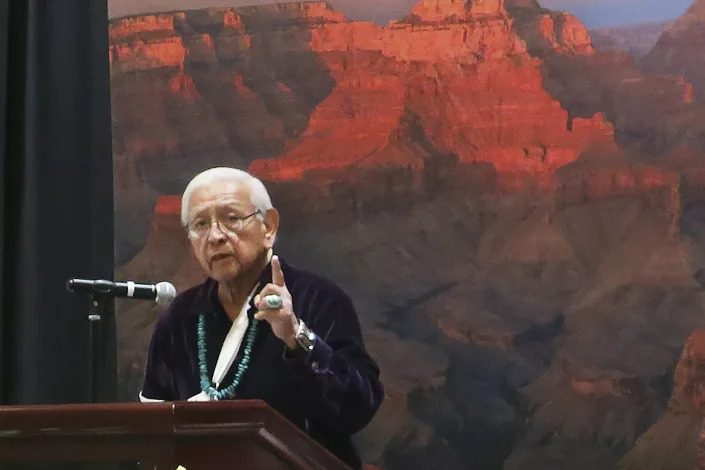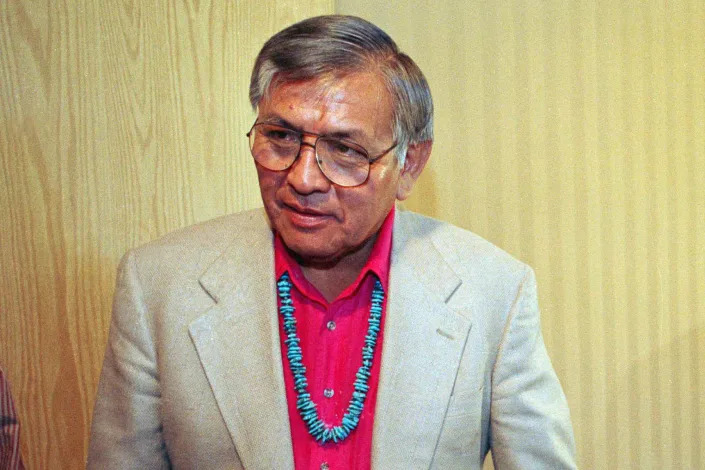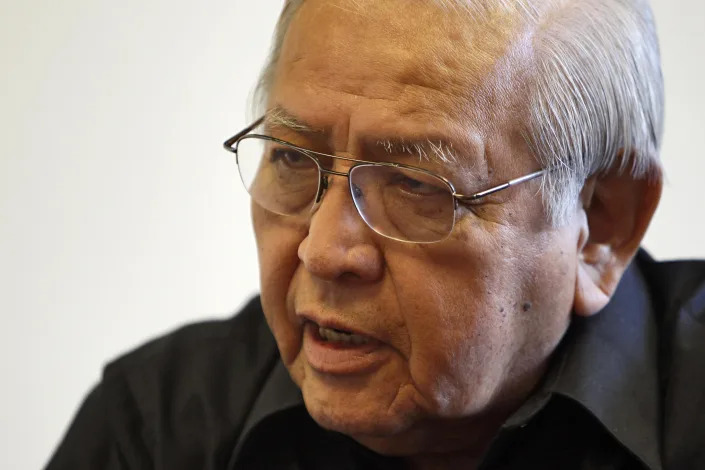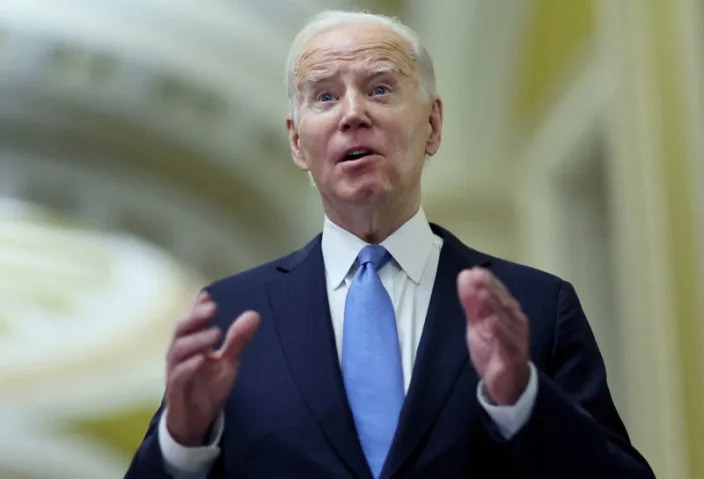JPMorgan sues former exec over ties to Epstein sex abuse
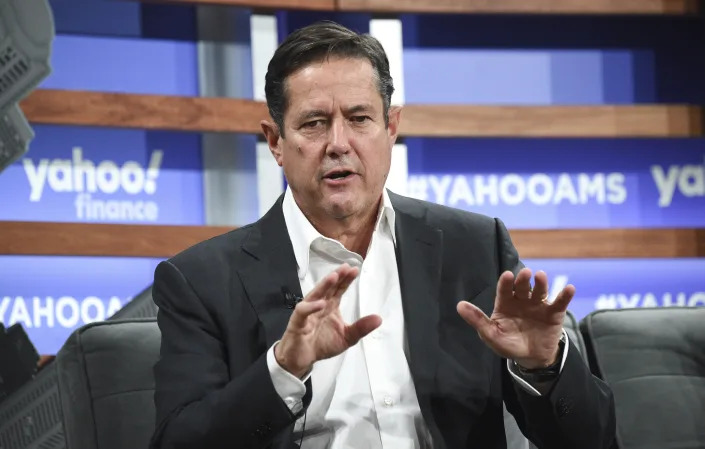
Barclays CEO Jes Staley participates in the Yahoo Finance All Markets Summit at Union West on Oct. 10, 2019, in New York. Facing lawsuits over its own relationship with Jeffrey Epstein, JPMorgan Chase on Wednesday, March 8, 2023, sued its former executive Staley, saying he knew “without a doubt” that Epstein was abusing and trafficking girls. (Photo by Evan Agostini/Invision/AP, File)
KEN SWEET
Wed, March 8, 2023
NEW YORK (AP) — JPMorgan Chase sued its former executive Jes Staley on Wednesday, alleging that he aided in hiding Jeffrey Epstein’s yearslong sex abuse and trafficking in order to keep the financier as a client.
The New York bank seeks to hold Staley personally liable for any financial penalties that JPMorgan may have to pay in two related cases. It is also seeking to force Staley to pay back wages he earned during the time he allegedly was aware of the abuse and “personally observed” Epstein's behavior on multiple occasions.
“In light of Staley’s intentional and outrageous conduct in failing to disclose pertinent information and abandoning (JPMorgan’s) interests in favor of his own and Epstein’s personal interests, (the bank) is entitled to punitive damages,” the bank said in its lawsuit.
A lawyer for Staley had no comment on the lawsuit.
JPMorgan's lawsuit was filed after the bank was sued by the government of the U.S. Virgin Islands, as well as by a woman identified as Jane Doe, who was allegedly abused by Epstein. Those lawsuits claim JPMorgan should have seen evidence of Epstein's sex trafficking and knowingly benefited from it.
Previous lawsuits have shown Staley and Epstein exchanged hundreds of emails and text messages over the years, and they were seen to have a close relationship that went beyond the professional relationship a banker would have with a wealthy client.
The bank continues to deny the allegations in its lawsuit, however it appears to allege that Staley may have committed sexual assault. It notes in its lawsuit that the anonymous Doe described a “powerful financial executive” could “use his clout within JP Morgan to make Epstein untouchable.” The bank says that the financial executive was Staley.
Epstein was arrested in 2019 on federal charges accusing him of paying underage girls hundreds of dollars in cash for massages and then molesting them at his homes in Florida and New York. He was found dead in jail on Aug. 10 of that year, at age 66. A medical examiner ruled his death a suicide.
Staley left JPMorgan in 2013 to become CEO of London-based bank Barclays. He resigned last year following a report by British regulators into his past links with Epstein.
____
AP Business Writer Barbara Ortutay contributed to this report from San Francisco.

Barclays CEO Jes Staley participates in the Yahoo Finance All Markets Summit at Union West on Oct. 10, 2019, in New York. Facing lawsuits over its own relationship with Jeffrey Epstein, JPMorgan Chase on Wednesday, March 8, 2023, sued its former executive Staley, saying he knew “without a doubt” that Epstein was abusing and trafficking girls. (Photo by Evan Agostini/Invision/AP, File)
KEN SWEET
Wed, March 8, 2023
NEW YORK (AP) — JPMorgan Chase sued its former executive Jes Staley on Wednesday, alleging that he aided in hiding Jeffrey Epstein’s yearslong sex abuse and trafficking in order to keep the financier as a client.
The New York bank seeks to hold Staley personally liable for any financial penalties that JPMorgan may have to pay in two related cases. It is also seeking to force Staley to pay back wages he earned during the time he allegedly was aware of the abuse and “personally observed” Epstein's behavior on multiple occasions.
“In light of Staley’s intentional and outrageous conduct in failing to disclose pertinent information and abandoning (JPMorgan’s) interests in favor of his own and Epstein’s personal interests, (the bank) is entitled to punitive damages,” the bank said in its lawsuit.
A lawyer for Staley had no comment on the lawsuit.
JPMorgan's lawsuit was filed after the bank was sued by the government of the U.S. Virgin Islands, as well as by a woman identified as Jane Doe, who was allegedly abused by Epstein. Those lawsuits claim JPMorgan should have seen evidence of Epstein's sex trafficking and knowingly benefited from it.
Previous lawsuits have shown Staley and Epstein exchanged hundreds of emails and text messages over the years, and they were seen to have a close relationship that went beyond the professional relationship a banker would have with a wealthy client.
The bank continues to deny the allegations in its lawsuit, however it appears to allege that Staley may have committed sexual assault. It notes in its lawsuit that the anonymous Doe described a “powerful financial executive” could “use his clout within JP Morgan to make Epstein untouchable.” The bank says that the financial executive was Staley.
Epstein was arrested in 2019 on federal charges accusing him of paying underage girls hundreds of dollars in cash for massages and then molesting them at his homes in Florida and New York. He was found dead in jail on Aug. 10 of that year, at age 66. A medical examiner ruled his death a suicide.
Staley left JPMorgan in 2013 to become CEO of London-based bank Barclays. He resigned last year following a report by British regulators into his past links with Epstein.
____
AP Business Writer Barbara Ortutay contributed to this report from San Francisco.







